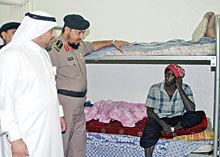MAKKAH, 15 January 2008 — The National Society for Human Rights (NSHR) yesterday criticized the Traffic Department in Makkah for the pathetic state of its detention centers.
Hussain Al-Sharif, general supervisor of the Makkah branch of the NSHR, lashed out at the traffic police when he noticed the squalid premises, dirty furnishings and worn out furniture at the detention center during a visit yesterday to the Traffic Investigations Department in Makkah.
Al-Sharif also expressed dissatisfaction that only three men staff the department. “This number does not match the size of traffic in the city where the accidents are numerous, particularly in the peak pilgrim seasons,” the rights official said.
The NSHR was also scathing in its criticism of the insurance companies that deal with accident cases. Al-Sharif said several people complained about the insurance firms cheating, postponing and making unnecessary delay in the payment of insurance claims.
The society demanded the Saudi Arabian Monetary Agency to be firm in enforcing the insurance regulations so that people could receive their insurance claims in a fair and prompt manner.
The society urged the Saudi Red Crescent and the Traffic Police to undertake the responsibility of expediting the transfer of bodies of accident victims so that the bereaved may receive them faster. The society viewed that the municipalities, who are currently responsible to take the bodies to hospital, did not have the means for speedy transport.
Al-Sharif affirmed that the visit and inspection of a detention house is within the jurisdiction of the NSHR. “The reason for our visit to the traffic detention center was to guarantee that the prisoners get the facilities that they are legally entitled for. But we found that the facilities there very poor.”
He stressed the importance of keeping the detention center in the best shape considering that the city received so many people from abroad and should uphold the qualities of a concerned host.
The rights official also underscored the need to find some substitute punishments other than detention if the offense was not serious. Currently, minor traffic violations — such as speeding — involves at least 24 hours in jail.
“The situation also called for the setting up of traffic courts so that the violations could be handled in a speedy and fair manner. At present traffic officials hand the punishment to motorists in an arbitrary manner though in several cases the suspect would be innocent,” Al-Sharif said.
Al-Sharif also stressed the need to open a clinic at the detention center so that any emergency case could be handled with speed instead of the present arrangement of taking the patients to hospital.
He said the traffic police should deal with the people with special needs with due consideration for their hardships.
The NSHR officials discussed with the policemen the various difficulties faced by them in their work. They also listened to policemen’s complaints such as the reduced opportunities for promotion and the long working hours, sometimes under very severe weather conditions. He said the society would bring their complaints to the attention of the concerned authorities for favorable action.


